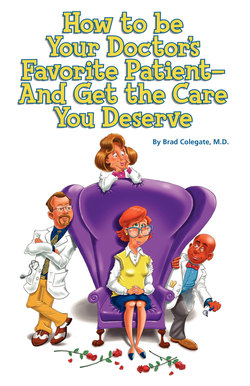Читать книгу How to be Your Doctor’s Favorite Patient - David Claytor - Страница 6
На сайте Литреса книга снята с продажи.
The Silent Type
ОглавлениеForty-three-year-old Hagob Nararan hadn’t been in to see his physician for several years, not since she removed a badly ingrown toenail from his right foot. Understandably, Dr. Debra Peters’ first question to her patient was “What brings you back after all this time?”
“Just a check-up,” he muttered.
Now Dr. Peters knew that someone who doesn’t come in for several years is not the type of person to seek regular check-ups without having a problem, so she persevered by asking, “Are you sure that you’re not having any particular health problems you need checked.?”
“No,” he said, and continued to answer in monosyllables as she ran down her usual checklist of questions.
Soon, she’d finished both the history and physical exam and concluded, “Everything seems to be normal. It would be a good idea to do a cholesterol test on you though, as a screening measure.”
“Okay.”
“I’ll write the order and then you can return anytime you’d like after you’ve been fasting for twelve hours, and we’ll draw the blood. You can call two days after that for the result.”
“Okay.”
As she turned to leave him, he asked, “Will the blood test check for everything?”
“Well, no, it’s just a cholesterol level. There are hundreds of different blood tests.”
“Oh.”
“Is there something you’re worried about that you’d like checked?”
“No. Well, yes. What about HIV?”
After much beating around the bush, Dr. Peters was able to ascertain that Mr. Nararan was worried about an encounter he had with a female prostitute while away on a business trip a few months ago. Although a widower, he was still tormented by the thought that he had dishonored his late wife by having sex with a hooker–and felt sure he’d be punished by catching HIV.
When the results came back negative in a few days, Mr. Nararan smiled and became effusive in his relief. “Thank you, thank you. Dr. Peters, you have made me so happy. I will be sure to see you whenever I have a problem.”
“Next time,” advised Dr. Peters, “just tell me what’s on your mind.”
Doctors aren’t mind readers; they base their diagnoses on the things their patients tell them. The less information they have, the more difficult it is to arrive at a correct diagnosis. Doctors will generally keep probing until they feel they have enough information. Of course, too much extraneous information can be bad, too. For example, in response to the question “When did you start having abdominal pain?” one could hear the following responses:
“A while ago.” (Too little info.)
“It started two weeks ago while I was just sitting on the couch reading.” (About right.)
“It started at 8:15 p.m. last Thursday while I was reading this new murder mystery, Black Ice, by Duane Patterson. He’s my favorite author.” (Too much!)
Some information, such as sexual concerns, may be difficult for you to talk about, but remember: your physician is your confidante. Besides, you won’t shock her–there’s probably nothing you can tell her that she hasn’t heard before (or at least read about in medical school).
Do tell the doctor the real reason you’re there.
Don’t just answer “yes” or “no” to all your doctor’s questions.
Do volunteer information that you think might be helpful.
Don’t keep secrets from your doctor when they relate to your problem.
Do expect confidentiality to be respected.
